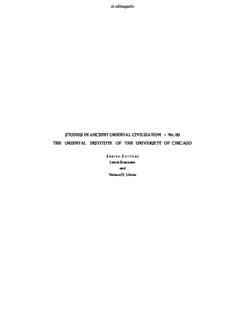
Studies in Semitic and Afroasiatic Linguistics Presented to Gene B. Gragg PDF
Preview Studies in Semitic and Afroasiatic Linguistics Presented to Gene B. Gragg
oi.uchicago.edu i STUDIES IN ANCIENT ORIENTAL CIVILIZATION • No. 60 THE ORIENTAL INSTITUTE OF THE UNIVERSITY OF CHICAGO S E R I E S E D I T O R S LESLIE SCHRAMER and THOMAS G. URBAN oi.uchicago.edu i i Gene B. Gragg. October 1997. Photo by Jason Smith oi.uchicago.edu iii STUDIES IN SEMITIC AND AFROASIATIC LINGUISTICS PRESENTED TO GENE B. GRAGG Edited by CYNTHIA L. MILLER THE ORIENTAL INSTITUTE OF THE UNIVERSITY OF CHICAGO S T U D I E S I N A N C I E N T O R I E N T A L C I V I L I Z A T I O N • No. 60 CHICAGO • ILLINOIS oi.uchicago.edu i v Library of Congress Catalog Card Number: 2007929536 ISBN: 978-1-885923-41-7 1-885923-41-4 ISSN: 0081-7554 ©2007 by The University of Chicago. All rights reserved. Published 2007. Printed in the United States of America. The Oriental Institute, Chicago Series Editors Acknowledgments The assistance of Katherine Strange Burke, Lindsay DeCarlo, and Katie L. Johnson is acknowledged in the production of this volume. Thanks are also due to Scott Branting, Director of the Center for Ancient Middle Eastern Landscapes (CAMEL) at the Oriental Institute, for his assis- tance with the maps. The image on the cover comprises the beginning of “A Magic Prayer of Henoch” in Geªez (folio 88 verso of University of Chicago Ms. 251, a Gospel of John with Magic Prayers, which is a codex forming part of the Goodspeed New Testament Manuscript Collection; courtesy of the Special Collections Research Center, University of Chicago Library). The text was first published by Gene B. Gragg in 1975. Printed by Edwards Brothers, Ann Arbor, Michigan The paper used in this publication meets the minimum requirements of American National Standard for Information Services — Permanence of Paper for Printed Library Materials, ANSI Z39.48-1984. oi.uchicago.edu v TABLE OF CONTENTS List of Figures ............................................................................................................................................................ vii List of Maps ............................................................................................................................................................... ix List of Tables ............................................................................................................................................................. xi Foreword. Gil J. Stein ............................................................................................................................................... xiii Preface. Cynthia L. Miller ......................................................................................................................................... xv The Research of Gene B. Gragg. Cynthia L. Miller ................................................................................................. xvii Bibliography of the Publications and Communications of Gene B. Gragg. Charles E. Jones .................................. xix Gene B. Gragg as a Teacher. Robert D. Hoberman ................................................................................................. xxv Dissertation Committee Service. Gene B. Gragg ..................................................................................................... xxvii 1. The Afrasian Lexicon Reconsidered. M. Lionel Bender .................................................................................... 1 2. PQD Revisited. Stuart Creason .......................................................................................................................... 27 3. ‘May the Gods Preserve You!’: The Variability of Injunctive *la in Epigraphic South Arabian and Its Relation to Jussive Forms within South Semitic. Joseph L. Daniels II .............................................................. 43 4. Littera ex occidente: Toward a Functional History of Writing. Peter T. Daniels .............................................. 53 5. The Story of Mem u Zine in the Neo-Aramaic Dialect of Bohtan. Samuel Ethan Fox ...................................... 69 6. Prenasalization in Aramaic. W. Randall Garr .................................................................................................... 81 7. A New Masoretic “Spell Checker,” or, a Practical Method for Checking the Accentual Structure and Integrity of Tiberian-Pointed Biblical Texts. Richard L. Goerwitz III ........................................................ 111 8. External Plural Markers in Semitic: A New Assessment. Rebecca Hasselbach ................................................ 123 9. Semitic Triradicality or Prosodic Minimality? Evidence from Sound Change. Robert D. Hoberman .............. 139 10. Akkadian-Egyptian Lexical Matches. Alexander Militarev ............................................................................... 155 11. Constraints on Ellipsis in Biblical Hebrew. Cynthia L. Miller ........................................................................... 165 12. The Ugaritic Alphabetic Cuneiform Writing System in the Context of Other Alphabetic Systems. Dennis Pardee .................................................................................................................................................... 181 13. West Semitic Perspectives on the Akkadian Vetitive. David Testen ................................................................. 201 Contributors .............................................................................................................................................................. 215 Index ..................................................................................................................................................................... 217 v oi.uchicago.edu v i oi.uchicago.edu vii LIST OF FIGURES 7.1 Overview of Parser/Checker ...................................................................................................................... 115 7.2 Sample Parse Tree ...................................................................................................................................... 116 7.3 Accents’ Structural Interpretation of Genesis 1:1 ...................................................................................... 117 7.4 Sample Error from Biblia Hebraica Stuttgartensia ................................................................................... 121 12.1 Ras Shamra Tablet RS 12.063 ................................................................................................................... 190 12.2 Ugaritic Alphabet: Comparison with Hebrew Alphabet (Abecedary RS 12.063) .................................... 190 12.3 Ras Shamra Text RS 24.281 ...................................................................................................................... 191 12.4 Ras Shamra Text RS 94.2440 .................................................................................................................... 191 12.5 Ras Shamra Text RS 16.265 ...................................................................................................................... 192 12.6 Ras Shamra Text RS 16.265 Left Edge Showing Different Hand from That of Main Text ..................... 192 12.7 Ras Shamra Text RS 88.2215 .................................................................................................................... 193 12.8 Ras Shamra Text RS 92.2016, Line 40 ...................................................................................................... 193 12.9 Ras Shamra Text RS 16.270 Bearing Double Impression of Personal Seal of Ammistamru II ................ 194 12.10 Ras Ibn Hani Bulla RIH 83/21 Bearing Triple Impression of Personal Seal of Ammistamru II ............... 195 12.11 Ras Shamra Text RS 15.111, Line 4, Showing Two-wedged Archaic Form of {g} in {Ëgrt} .................. 196 12.12 Ras Shamra Text RS 94.2440 Showing Imitative, Four-wedged Form of {s˝ }; (a) First Abecedary and (b) Second Abecedary ........................................................................................................................ 196 vii oi.uchicago.edu v iii oi.uchicago.edu ix LIST OF MAPS 4.1 Information Given in Most Accounts of Writing Provided to the General Public .................................... 54 4.2 Map Illustrating Three Patterns of the Functional History of Writing: Adaptive Reuse, Misunderstanding Model, and Scholarly Input Model; as well as Adoption of Script .............................. 63 ix oi.uchicago.edu x
Description: